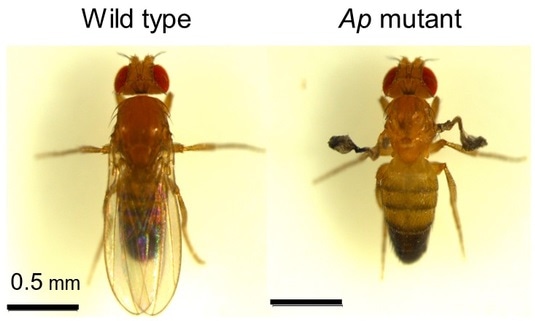Scientists from Tokyo Metropolitan University recently gained a deeper understanding of the biochemistry of long-term memory. The researchers investigated fruit flies and observed that the Apterous (Ap) protein plays a vital double role in maintaining memories. This protein binds with the Chi cofactor to help retain memories.

Flies with a mutation in the Ap gene have no wings. Image Credit: Tokyo Metropolitan University.
However, it also acted independently to control specific neurotransmitters and aid in a long-term consolidation. Findings similar to these would help in the development of novel approaches to the treatment of memory-related disorders.
Memories can be fluid, however, when some events are repeated or have a great impact, the memories of those events could be combined in the brains for long-term storage (long-term memory, LTM) and retained over prolonged periods. The biochemistry of memory is highly complex, and researchers are in terms with how it functions recently.
A group of researchers headed by Professor Takaomi Sakai of Tokyo Metropolitan University were investigating Drosophila fruit fly—a well-studied model organism—to understand how memory works in animals. Recent research by this team revealed the role performed by a familiar developmental regulator known as Apterous (Ap)—a protein that plays a key role in the physical development of flies.
The term “apterous” means wingless—flies having a mutation in the Ap gene are devoid of wings. Intriguingly, it was observed that Ap was active even after physical maturation. The reason remained a mystery.
The researchers have now identified that flies with an Ap mutation have issues with their long-term memory—the Ap expression in adults was key to how they recalled past events, and in the study it was stress from courtship inhibition.
Further analysis revealed that Apterous performs two significant roles in memory. By examining the brains of fruit fly, the researchers found Apterous in two locations the mushroom bodies (structures in the insect’s brain responsible for memory and learning) and clock neurons (responsible for sleep and behavioral arousal).
In the mushroom bodies, Ap functions in concert with a cofactor named Chi, assisting in the maintenance of long-term memories. Particularly, the Ap/Chi complex functions as a transcription factor, translating information in crucial genes to messenger RNA which then leads to protein production.
But Ap functions alone in the clock neurons. While comparing with Ap mutants, the researchers identified that Ap helped control the response of GABA receptors, responsible for responding to a significant neurotransmitter called gamma-aminobutyric acid (GABA). The correct amount of activity from GABA receptors helped stimulate the large ventral-lateral (l-LNvs) clock neurons needed to consolidate memories.
In experiments performed to substantiate this mechanism, the researchers countered some of the impacts of Ap mutation by artificially suppressing the expression of GABA receptors.
The work carried out by the researchers revealed the diverse ways in which Ap helps memory work in fruit flies. The detailed biochemistry revealed by the researchers provides insights into mammalian memory; mammals contain proteins that perform similar functions to Ap. The researchers anticipate that this breakthrough would lead to novel approaches for developing treatments for memory disorders and trauma.
Source:
Journal reference:
Inami, S., et al. (2021) Consolidation and maintenance of long-term memory involve dual functions of the developmental regulator Apterous in clock neurons and mushroom bodies in the Drosophila brain. PLoS Biology. doi.org/10.1371/journal.pbio.3001459.